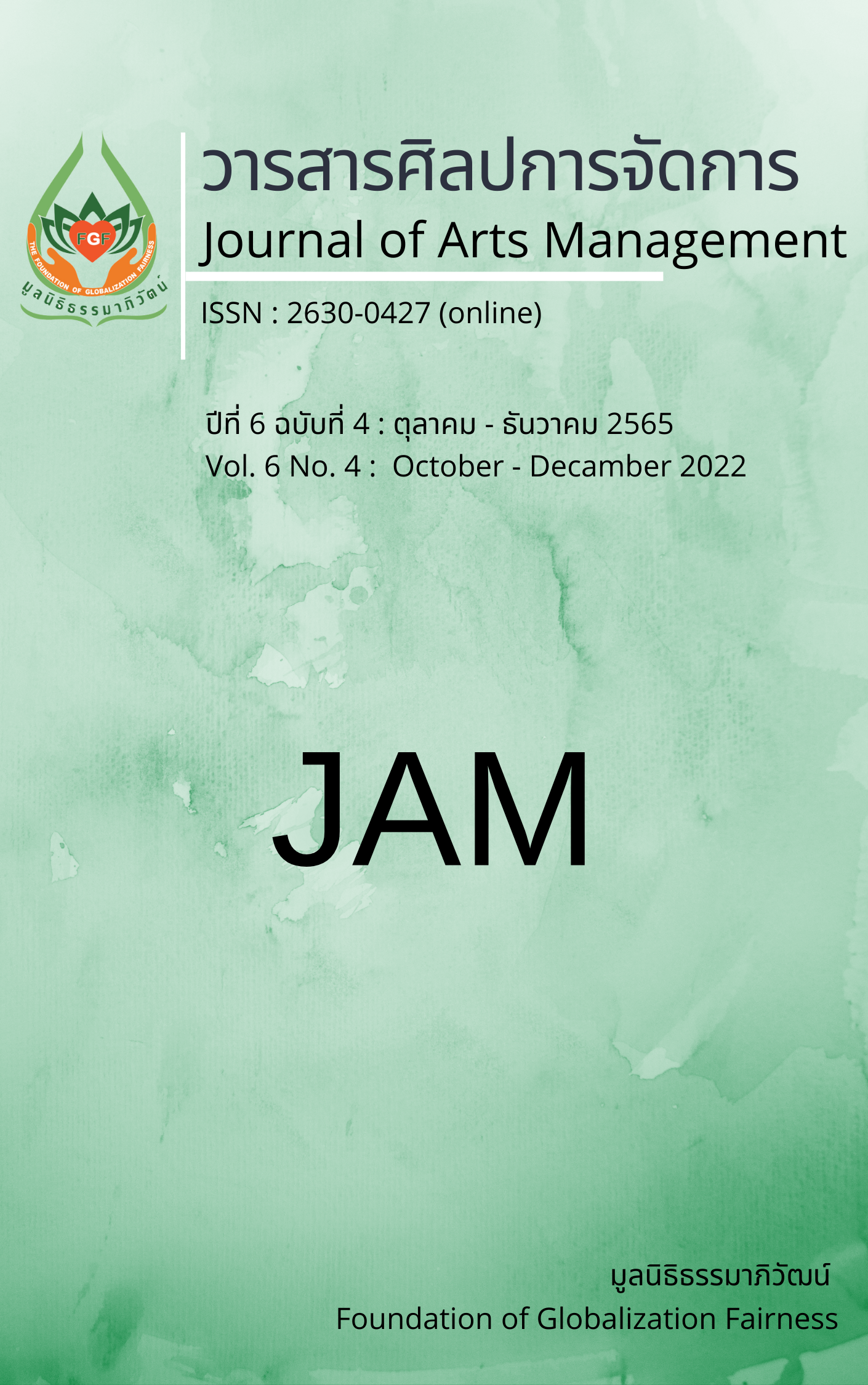Characteristics of New Successful Entrepreneurs in Food and Beverage Business in COVID-19 Pandemic
Main Article Content
Abstract
The purposes of this research were: 1) to study the meaning of new successful entrepreneurs in the food and beverage business during the COVID-19 Pandemic; and 2) to study the characteristics of the food and beverage business during the crisis of COVID-19. This research was a qualitative research study using the grounded theory methodology. Twelve new successful entrepreneurs in the food and beverage business were purposefully selected as the key informants of this research study. Data were collected by in-depth interviews by employing semi-structured guideline questions and analyzed by using content analysis to define the meaning and characteristics of a new successful entrepreneur.
It was found that: 1. The new successful entrepreneur in the food and beverage business may differ in several ways due to the entrepreneur’s goal; satisfaction with business success; and happiness in doing business. There were four key components to being successful in business: financial return, customer’s satisfaction, employee’s satisfaction, and entrepreneur’s personality; and 2. The finding showed the key characteristics of the new successful entrepreneur in the food and beverage business were reflected in the soft skills, which consisted of five main components: 1) creativity; 2) learning and self-development; 3) service minded; 4) determination and patience; and 5) self-confidence.
Article Details

This work is licensed under a Creative Commons Attribution-NonCommercial-NoDerivatives 4.0 International License.
Views and opinions appearing in articles in the Journal of Arts of Management It is the responsibility of the author of the article. and does not constitute the view and responsibility of the editorial team I agree that the article is copyright of the Arts and Management Journal.
References
Borisut, S., & Pakasat, N. (2019). The Effects of Human Capital Entrepreneur characteristic on the successful operation of Gen Y. Veridian E-Journal, Silpakorn University (Humanities, Social Sciences and Arts), 12(5), 1099-1107.
Charmaz, K. (2014). Constructing grounded theory: a practical guide through qualitative analysis. SAGE Publications.
Charoenpanich, S. (2021, November 10). SMEs business analysis of Restaurant business. https://www.sme.go.th/upload/mod_download/download-20210909160132.pdf.
Chokpromanan, W., & Jadesadalug, V. (2015). The Affects Entrepreneur Characteristic on The Successful Operation of Store Entrepreneur in Don Wai Floating Market, Nakhon Pathom Province. Veridian E-Journal, Silpakorn University (Humanities, Social Sciences and arts. 8(2), 967-988.
Department of Business Development. (2021, September 20). Business Information in Eastern Economic Corridor (EEC).
https://www.dbd.go.th/news_view.php?nid=469412355.
Frederick, H. H., Kuratko, D. F., & Hodgetts, R. M. (2007). Entrepreneurship: Theory, Process and Practice. Thomson.
Frese, M. (2000). Success and failure of microbusiness owners in Africa: A psychological Approach. Greenwood Publishing Group.
Havanon, N., Jeradechakul, P., & Pudthaisong, S. (2007). The Grounded Theory for Strengthened Community. The Thailand Research Fund.
Karsawai, F., Pooncharoen, N., & Chamornman, W. (2011). The Study of Successful Characteristics of Hotel Business Entrepreneurs in The Lower Northern Provinces of Thailand. MIS Journal Faculty of Management and Information Sciences Naresuan University, 7(1), 39-50.
Kettian, W. (2013). Effect of Entrepreneurial Characteristics on Business Success of the Medium Enterprises in the Lower Part of the Northeast[Master’s Thesis, Rajamangala University of Technology Isan].
Mahaphasuthanon, T. (2011). Principle of Management. PNK & Sky Printings.
Office of the National Economic and Social Development Council. (2021, September 30). National Strategy 2018–2037. https://www.nesdc.go.th/download/document/SAC/NS_SumPlanOct2018.pdf.
Office of the National Economic and Social Development Council. (2021, September 30). Entrepreneur and medium-sized enterprises and small size. http://nscr.nesdc.go.th/wp-content/uploads/2022/02/14_NS-08_140265.pdf.
Phothisita, C. (2019). Science and art of qualitative research (8th ed.). Amarin.
Phuanpoh, Y. (2018). Types of restaurants with characteristics of the successful restaurant entrepreneurs in Phra Nakhon Si Ayutthaya Province. Veridian E-Journal, Silpakorn University. 11(1), 303-321.
Ratanasongtham, W., & Tungjirasil, B. (2020). Key Success Factors of Entrepreneurs in Small Business of Furniture Manufacturing and Distribution: Case Study the Lampoon Entrepreneurs in Roi Et Province. Journal of Industrial Business Administration, 2(2), 59-76.
Strauss, A., & Corbin, J. (1990). Basics of Qualitative Research: Grounded Theory Procedures and Techniques. SAGE Publications.
Tripopsakul, S., & Pichyangkul, C. (2018). Factors Influencing Youth Entrepreneurs in Thailand. NIDA BUSINESS JOURNAL, 22(1), 44-60.
Wongsa, S. (2017). Qualitative Research with Grounded Theory Procedures: Concept, Method, and Caution. LIBERAL ARTS REVIEW, 15(1), 117-130.


